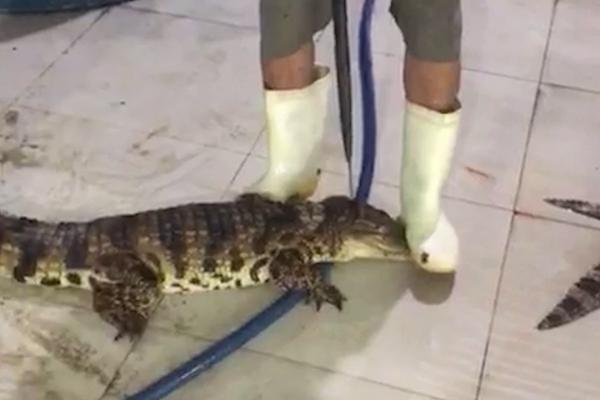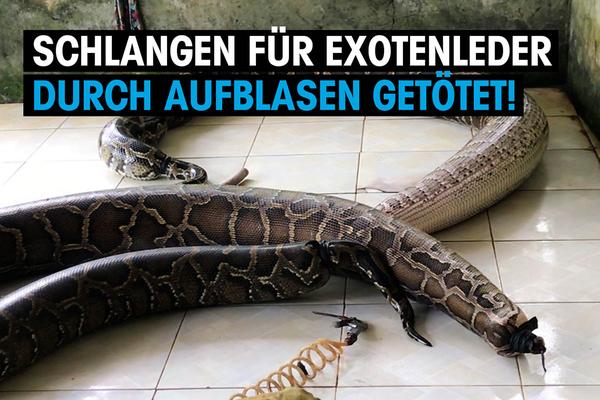There are never beforehand pictures that Peta Asia from Vietnam was released: thousands of snakes, locked up in cages and then killed by violently pumping up their bodies.Crocodiles to which workers add electric shocks, whip their bodies with metal blades and inflate with an air compressor.They are probably skinned with lively body.Bags, shoes, belts and other accessories traded worldwide are made from the skin's skins.
The cruelty to animals you see here is common practice in the exotic industry industry.And even millions of other animals suffer for luxury products made of the worst agony.
Snakes pumped up with lively body
The recordings show that workers' mouth and anus of the pythons close with narrow ribbons.Then cut a hole in the head or tail, insert a hose and pump the animals of the animals with compressed air.According to international standards, this method of killing is considered "inhuman" and "unacceptable" and, according to the reptile expert, leads DR.Clifford Warwick to "extreme stress and pain".A worker was filmed how he intentionally stands on a snake - apparently to further increase the pressure.
Snakes feel pain and stress
As the eyewitness found out, the snakes are stunned with the help of a car battery before killing - but an electric shock is not a humane or acceptable method for anesthesia or killing reptiles.Dr.According to Warwick, the normal mobility and responsiveness of reptiles quickly return after such a shock.There is no sufficient evidence that electric shocks switch off the pain or stress sensation of reptiles.
As she was pumped up, a snake moved back and forth
Peta Asia's recordings show that the tail of a snake is moving during the pumping - a sign that Pythons may still be alive when you pull the skin off the body and grazing it.The eyewitness never saw that the vital functions were checked before the animals were slaughtered.
PETA and their international partner organizations have contacted Louis Vuitton and other brands that sell snake leather and pointed out the suffering of the animals.Nevertheless, the companies continue to benefit from this cruelty to animals.
Sign the petition to Louis Vuitton now
Caps locked for exotic leather in narrow, dirty cages
The snakes usually live in lavish primeval forests or swamps, surrounded by the diverse stimuli on which their nature is designed. In Gefangenschaft hingegen werden die Tiere in dreckigeDrahtkäfige gesperrt, in denen sie sich nicht einmal vollständig ausstrecken können – freie Bewegungen oder Klettern sind unmöglich.The locked animals do not receive water or food and have anything in the cages with which they deal with or what they could hide - no water to swim.In commercial slaughterhouses, such a accommodation is common.
Exototia industry as the trigger of the next pandemic?

Covid-19 pandemic has shown the world that the keeping of sick, stressed animals in a confined space and under unsanitary conditions forms a perfect breeding site for deadly viruses.This also includes snakes in captivity, because they are susceptible to diseases.The eyewitness of Peta Asia learned that many prisoners in Vietnam apparently suffer from mites.When he asked what to do about it, the employee only said: "What should that bring?We skin them anyway."
Crocodiles with metal blade slit and skinned
Peta Asia's eyewitness also reached recordings that show stacked crocodiles on top of each other.The animals were put in sacks in which they cannot move;Your mouths were tied.A worker runs across the crocodiles and, apparently with a car battery, gives them electric shocks.However, electric shocks have a different effect on reptiles than in other animals.There is no sufficient evidence that they become passed out before the workers start killing.
Anschließend schlitzen weitere Arbeiter die Krokodile mit einer Metallklinge auf – man bezeichnet dies als „Nackenstich"-Methode.Dr.According to Warwick, the animals are not immediately dead with this method.Rather, workers severe or damage the spinal cord, which leads to paralysis and probably extreme pain, but not death.A scientific evaluation of the method has confirmed that crocodiles can still be alive for over an hour and a half after using the procedure.The crocodiles shown in the video were therefore most likely alive and fully sensitive to pain when they were inflated, skinned and gotten..This killing method is widespread in Asia, including in Vietnam, Indonesia, Malaysia and on the Philippines.
Crocodiles in crowded concrete enclosures
The eyewitness from Peta Asia was also able to document crocodiles on four other Asian farms, which were kept in overcrowded concrete enclosures with cloudy water.Under these cramped keeping conditions, there are often aggression between the animals that result in injuries, infections and diseases.Dr.According to Warwick, "the husbandry conditions of the crocodiles were largely unsanitary and continuously represented a potential risk of illness - both for the animals and the people working there.In my experience, such adverse conditions are common in almost all crocodile farms."
Animals in the exotic leather industry - terrible life, cruel death
Even before these current recordings, PETA and her international partner organizations have already succeeded several times to document enormous animal suffering in the exotic leather industry.For example, Peta was able to publish shocking video material from Vietnamese crocodile farms, the animal skins on LVMH, the parent company of Louis Vuitton, delivered.PETA USA brought shots from battle businesses for ostriches to the public, which show how the animals are beaten by workers and their throats are flashed.The skin of ostriches is used for the minute-textured leather bags, which also sells Louis Vuitton.
Not only the Louis Vuitton brand benefits from the suffering of the animals.In Australia, the French fashion label Hermès is currently planning to build the largest crocodile factory in which up to 50.000 crocodiles should be locked up at the same time - so that your skin can also be processed into expensive bags, belts and other accessories.[1]
What you can do
PETA and PETAS international partner organizations have already uncovered various cruel killing methods that are common in the exotic industry industry.Snakes are mostly nailed on a tree, headed or cut open and then skinned alive.Workers kill crocodiles by ramming a metal rod into their spine.And lizards are killed or their spine is cut with a chisel.
Please do not support this animal suffering.Never buy bags, belts or other accessories made of exotic leather.There are so many animal and environmentally friendly vegan materials that nobody has to wear or sell exotic leather.
Only apply vegan fashion and ask Louis Vuitton today not to sell exotic leather:
Sign the petition now
Sources
[1] Redfearn, Graham (2020): Australian Farm to Hold 50,000 Crocodiles for Luxury Hermès Goods Questioned by Animal Welfare.The Guardian.Online: Groups https: // www.The Guardian.COM/Environment/2020/Nov/15/Australian-Farm-Farm-to-Hold-50000-Crocodile-for-Luxury-Hermes-Goods-Questioned-by-Animal-Welfare groups [last accessed on 29.12.2020]



